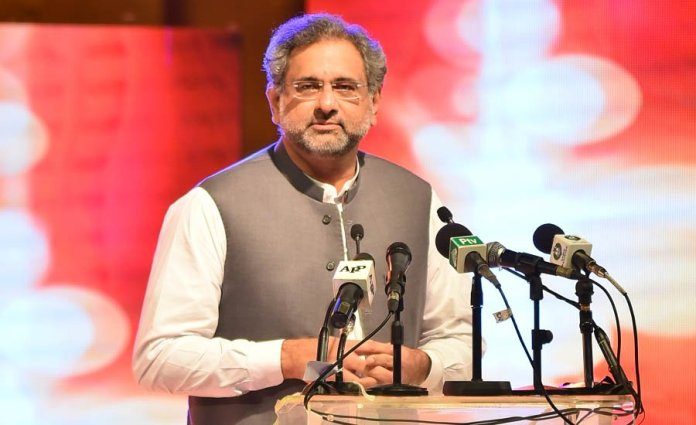ISLAMABAD: As expected, the government finally announced a tax amnesty scheme to whiten black money, in a bid to meet the financial woes of the government.
Prime Minister Shahid Khaqan Abbasi, after a meeting of the Economic Advisory Council, on Thursday has announced a special tax amnesty scheme for the Pakistanis who are non-payers. Addressing a press conference after the meeting here Thursday, the premier said those having annual income of Rs1.2 million would be exempted from income tax.
The maximum tax under the new amnesty scheme, which will be continued till June 30, 2018, will be 15 per cent levied on annual income of over Rs4.8 million. The prime minister, who was flanked by his advisor on finance and revenue Miftah Ismail and information minister Maryam Orangzeb, said those having their assets abroad can benefit from this scheme after paying only 2 per cent penalty while those in Pakistan will be required to pay 5 per cent penalty through the new scheme.
Claiming that the fresh scheme was aimed at inviting more people into tax net, the prime minister claimed that the amnesty was much different with the schemes introduced previously.
Though the premier could not justify why the government was introducing such a scheme at a time when it is going to complete its term after the next 55 days, he said since the ruling party enjoys the mandate, it will do lawful things even on last day of its government.
The prime minister also failed to justify how such a scheme is being launched without prior debate in the parliament. However, he said, the matter could be discussed in the parliament but initially it would be launched through the presidential ordinance for nearly 2.5 months.
He claimed no political party can negate such a scheme as they have also mentioned the measures of increasing tax net in their political manifesto. He claimed, only 700,000 people across the country pay taxes, and the non-payment of taxes increases indirect tax burden on the common people.
In reply to a query that whether the Sharif family, which is already in hot water for its undeclared assists abroad, will also benefit from the amnesty, the premier said, the political figures and their dependents would not benefit from the scheme.
Replying to another query, Shahid Khaqan Abbasi said holding an offshore company is not crime. The owners of offshore firms have now the opportunity to declare assists and become tax payers.
To another question, he said, no tax avoider will be harassed by sending police to his residence. However notices will be served to them after the closure of financial year. He also admitted that tax avoiders after the notices are served would be given punishment too but for the punishment parliament will legislate rules.
“Court will decide about the fate of scheme if the matter is raised in the court,” he said while replying to another query.
Though the premier admitted that there were challenges of current account deficit, but he avoided to admit that the scheme is aimed at generating revenue keeping in mind the significant challenges it faces on economic front.
Prime Minister, while announcing reductions in the percentage of the income tax, said the citizen having income between Rs1.2 to 2.4 million annually would pay 5 per cent income tax. The rate of income tax for the income bracket of Rs2.4 to 4.8 million would be 10 per cent and 15 per cent on more than Rs4.8 million.
PM Abbasi said in future, the Computerized National Identity Card (CNIC) number will be used as the income tax number. He expressed the confidence that the substantial reduction in income tax rate would serve as an incentive for people to pay tax.
He further noted that of the 1.2m filers, only 700,000 actually paid tax, while others filed returns but paid no income tax. Of the taxpayers, “90 per cent of those who are paying income tax are those whose tax is deducted at source,” he regretted.
The premier, while talking about investments being parked in the real estate sector, said that this scheme would provide an opportunity to the property holders to declare their real value of assets. A 2 per cent preemptive tax will have to be paid on all property transactions. Furthermore, the government will retain the right to purchase any property by paying 100pc over and above its declared value.
He said the government would monitor citizens’ financial records and issue notices if they find evidence of tax evasion. People who hold undocumented assets outside the country will be able to bring cash back to the country by paying a 2 per cent penalty. Other assets will incur a 3 per cent penalty. Foreign dollar accounts will also be eligible for amnesty on payment of a 5 per cent penalty.
Moving on, the prime minister said: “On any property that citizens purchase, they will have to pay a one per cent ‘presumptive tax’. That tax will be adjusted in their annual taxes.”
“To avoid under-invoicing [in property sale and purchase deeds], the government now holds the right to buy any property that a citizen holds by paying 100 per cent over its declared price,” he warned.
“Lastly, the government will be able to now monitor all financial transactions that citizens make so that they do not evade tax,” the prime minister said, explaining that the government is able to monitor all financial transactions made by citizens and will send notices to non tax-paying citizens and tell them to explain their financial situation.
Explaining that punitive measures for those who still fail to comply will be decided on by parliament, the prime minister promised another press briefing in the near future to explain the country’s financial situation.
In reply to a query, the prime minister said he claimed two important stakeholders, judiciary and army have no reservations over the amnesty scheme.
























